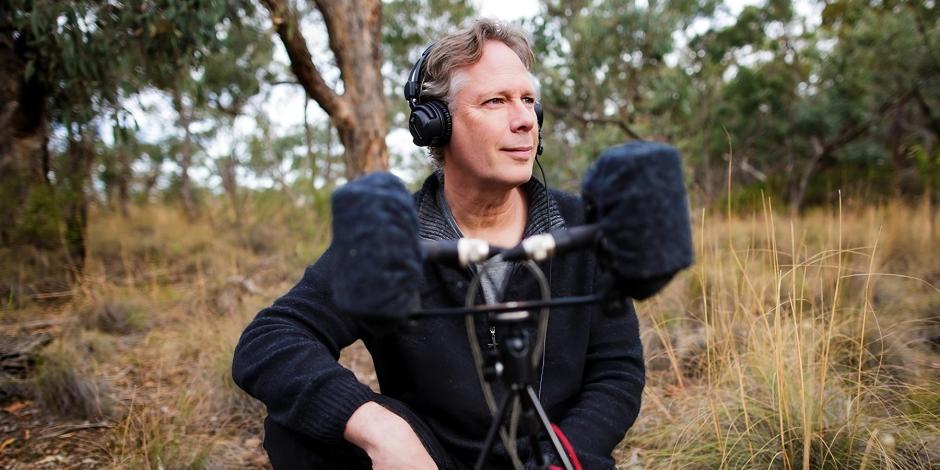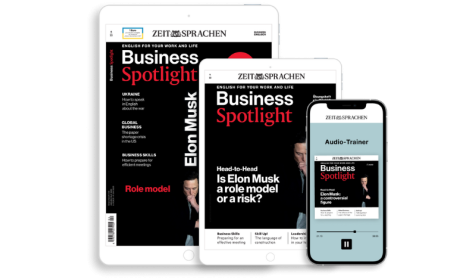Starten Sie den Audio-Text
Mit dem Audio-Player können Sie sich den Text anhören. Darunter finden Sie das Transkript.
Some jobs are truly uniqueeinzigartigunique. Andrew Skeoch, one of Australia’s leading wildlifeTierwelt, Wildtierewildlife sound recordists, spoke to Business Spotlight about how he got into this career and what it has taught him. Listen carefully.
Melita: How did you first get into recording the sounds of wildlife?
Andrew: I used to go bush-walking every weekend, go down the creekBachcreek at the bottom of our suburbVorortsuburb in Sydney and hikingWandernhiking in the Blue Mountains. And I knew all my birds when I was young. I spent a lot of my 20s travelling and came back to Australia, and the first thing I wanted to do was to go bush [non-standard] and just reacquaint oneself (with sth.)sich (mit etw.) wieder vertraut machenreacquaint myself. That felt like coming home to me — it was to go to the bush. While I was camping out, I just thought, “What am I gonna do with my life?” I had absolutely no idea. And I thought, “There are two things that I love in life: one is music; the other is nature.” So, I started with music and set up a recording label and one of the first projects that we — I mean myself and my partner, Sarah — envisage sth.etw. ins Auge fassenenvisaged was to record some music outdoors in the natural environment, with the birdsong that was there. We went into the desert, and I was just be amazed at sth.von etw. begeistert seinamazed at what I heard. It was just so beautiful. And we came back from that trip. We finished the music recording, but for the next album we wanted to do, I just thought, “Music’s not it. Let’s see if we can just do nature sound.” And at that time, there was no one doing anything like that. And so, erm, this is what we wanted to do. We thought, “This is just so beautiful. The sounds that we’re recording are wonderful. Other people will enjoy hearing this.” And we produced that first CD. And sure enough, it found a market.
Melita: And what do you think people can learn from listening more closely to the sounds of our natural environment?
Andrew: Nature is a sustainablenachhaltig; hier: dauerhaftsustainable system, and when you listen to it, you can hear how communication assists and informs that sustainability. Cooperation in nature is ubiquitousallgegenwärtigubiquitous. You can hear it, you can understand it. Erm, competitionWettbewerbcompetition, which we think of as natural, is not. Competition exists in nature, but there is [non-standard] always costs to competition. Nature avoids those in the most extraordinary behaviours, of which a lot of birdsong is a good example of them avoiding the harm of directly compete with each othermiteinander konkurrierencompeting with each other. We can learn from these things and, you know, instil sth. in(to) sth.etw. an etw. weitergebeninstil them into our governanceStaatsführunggovernance and education and economic systems to create a more sustainable, peaceful society. And that’s what we’re going to have to adapt to, I believe. The effects of disruptionStörung, tiefgreifender Wandeldisruption and human impactAuswirkung(en)impacts on nature are complex and subtlesubtilsubtle. It’s not as simple as nature getting quiet or something like that. It’s more that the complex patternMusterpatterns and relationships of communication in nature are starting to fragment and break down. You just don’t find the synchronization of communications that I remember recording 30 years ago. Part of that is diminished populations or even missing speciesArt(en)species, but as soon as you start changing things like this in a system, everything falls apart a little bit at the edges. It’s a little bit, I suppose, like if you get stressed, you stop making sense and stop communicating with people around you in a nice, calm, relaxed, clear, open way. You start becoming a difficult person, you know? And in a way, that’s what I’m hearing in nature, that everything’s getting a little bit fragmented.
Neugierig auf mehr?
Dann nutzen Sie die Möglichkeit und stellen Sie sich Ihr optimales Abo ganz nach Ihren Wünschen zusammen.



